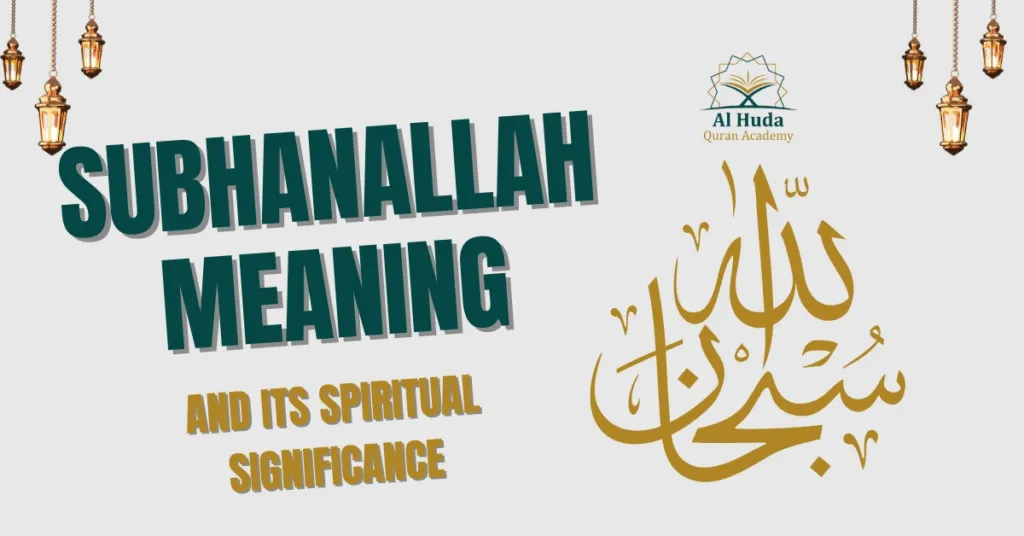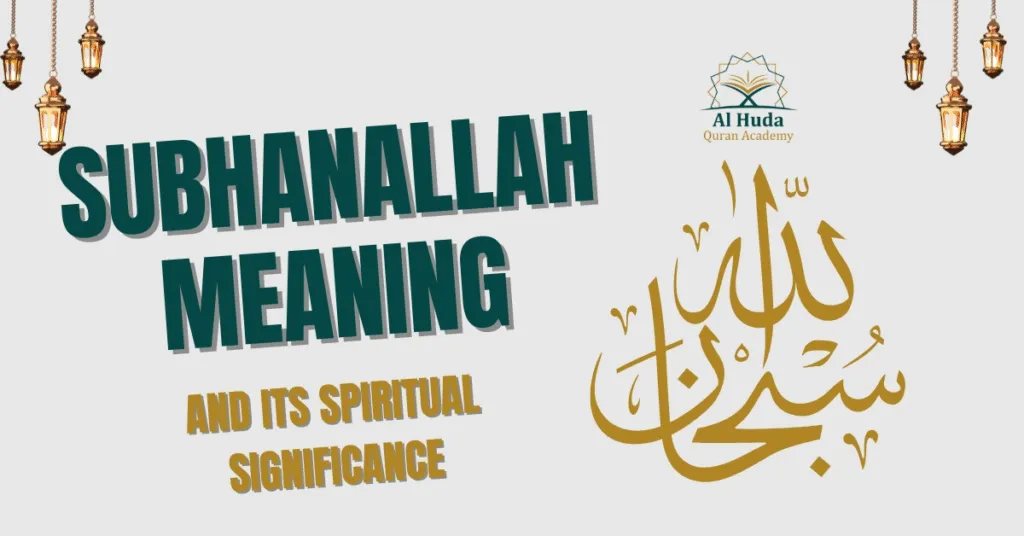For Muslims, SubhanAllah is a phrase that serves as an indication of Allah’s perfection and glory which Allah and the Quran have ordered or indicated But the phrase Subhanallah means more than beauty itself, and It can also serve as beauty recognition which is deeply therapeutic in its nature and for a Muslim, an act of worship as well affiliated paradigm intended leap through transcend the inner boundaries of thought. In this blog, we will discuss the meaning of the Subhanallah, its relevance in the Quran, literature and its impact to contemporary Muslims around the globe.
This article is aimed at making sure every reader fully understands the practical ways of how the phrase SubhanAllah can be used on a day to day basis for spiritual purposes.
The Power of a Single Word
For believers, the phrase SubhanAllah might also appear straightforward. Simplicity is sincerely concealed profundity and renders the term powerful. Enhanced non secular focus, accompanied with modesty and reverence, deliver Subhanallah the strength to function as a consistent reminder of Allah’s beauty.
Why This Topic Matters to Muslims Today
In the modern age, many Muslims are spiritually disconnected due to the rapid pace of daily living. The word “SubhanAllah” has the effect of prompting attention to mindfulness and encourages a sense of being thankful while navigating the complexities of life. Knowing its meaning and importance may enrich peace and balance in a Muslim’s daily life.
What Does SubhanAllah Mean?
It is an expression that glorifies Allah, meaning “Glory be to Allah” or “Praise be to Allah.”
Linguistic Roots and Definition
The word “SubhanAllah” originates from Arabic and is constructed from two components. To appreciate its true meaning, it’s important to explore these linguistic roots.
Arabic Breakdown: “Subhana” + “Allah”
- Subhana (سُبْحَانَ): This term denotes glorification, exaltation, and declaring something to be free from any imperfections or flaws. It signifies ultimate purity.
- Allah (اللَّه): The unique and majestic name of God, referring to the one true Creator of the universe.
When combined, “SubhanAllah” translates to “Glory be to Allah” or “Exalted is Allah,” highlighting His perfection and freedom from any human shortcomings.
The Literal and Deeper Meanings
On a literal degree, SubhanAllah expresses amazement and reverence for Allah’s perfection. On a deeper stage, it’s far from an acknowledgment of Allah’s endless greatness. It serves as both a statement and a tool for connecting with His divine attributes.
Where is SubhanAllah Found in the Quran?
SubhanAllah is a profound expression of Allah’s perfection and glory, regularly recited in moments of reward and mirrored image.
Quranic Verses That Mention SubhanAllah
SubhanAllah is determined time and again for the duration of the Quran, embedded in verses glorifying Allah. For example:
- Surah Al-Isra (17:44): “The seven heavens and the earth and whatever is in them exalt Him. And there is not a thing except that it exalts [Allah] by His praise, but you do not understand their [way of] exalting.”
This verse conveys how even the most seemingly insignificant parts of creation glorify Allah.
Context of Its Usage in Revelation
The Quran employs the word SubhanAllah regularly to name hobbies to Allah’s perfection in light of human imperfection, emphasizing that Allah on his own is free from mistakes or deficiency.
When and How Do Muslims Say SubhanAllah?

In Daily Prayers (Salah)
SubhanAllah is a central part of Muslim prayers and is recited in:
- Ruku (bowing): “Subhana Rabbiyal Azeem” (Glory is to my Lord, the Most Great).
- Sujood (prostration): “Subhana Rabbiyal A’la” (Glory is to my Lord, the Most High).
During Tasbih and Dhikr
Muslims frequently repeat SubhanAllah as part of tasbih (spiritual counting and praise), which involves saying:
- SubhanAllah
- Alhamdulillah
- Allahu Akbar (33 times each after Salah).
As Spontaneous Praise
Muslims, in their day-to-day lives, routinely say SubhanAllah at the sight of phenomena that are quite magnificent, incredible, or unpredicted. This is used as an expression of thankfulness and amazement.
SubhanAllah in Dhikr (Remembrance of Allah)
SubhanAllah is referred to as a statement which glorifies Allah, and further indicates his immeasurable supremacy and flawlessness.
Role in Tasbih: 33 Times After Salah
Prophet Muhammad saw used to tell Muslims to say SubhanAllah 33 times along with Alhamdulillah and Allahu Akbar sequentially after each Salah, as a way to remember Him and show thankfulness.
Connection with Alhamdulillah and Allahu Akbar
In combination, these phrases give a complete expression of a believer’s devotion to Lord:
- SubhanAllah-The perfection of Allah is honored.
- Alhamdulillah-Thankfulness to Allah is given.
- Allahu Akbar-Allah’s greatness is acknowledged.
Spiritual Significance of SubhanAllah
This indicates a claim for the astonishing greatness and purity of Allah and serves as surrender towards Him and glorifies Him.
A Tool for Purification of the Heart
Saying SubhanAllah frequently encourages a believer to pay more attention to Allah’s greatness, which helps the person become more modest.
Builds a Strong Connection with the Creator
SubhanAllah strengthens the ties between a Muslim and Allah, helping the Muslim to ponder about His unbelievable attributes and If He is there at all.
Brings Peace, Gratitude, and Reflection
By continuously repeating SubhanAllah, a Muslim builds individual tranquility and gratefulness which makes them able to withdraw from the disorder of things that make up everyday life.
The Impact of Saying SubhanAllah Regularly
In Islam, saying ”SubhanAllah” calms daily activities and life while increasing self-awareness and strengthening affirmation.
Mental and Emotional Calm
Relaxation and leisure while doing daily responsibilities reduces stress and enhances health.
Habit of Mindful Living
Saying subhanAllah helps Muslims to appreciate the works within and around them personally and socially.
SubhanAllah in Everyday Life
It assists in remembering Allah’s beauty and showing gratitude in daily life.
Reacting to Natural Beauty and Miracles
Whatever it is that is wonderful and miraculous in life, be it the birth of a child or a fantastic sunset, SubhanAllah helps Muslims celebrate Allah’s creativity and binds them to His wonders.
A Positive Alternative to Complaints
Instead of grieving for the demanding situations, Muslims may additionally shift their angle and thank Allah for His attributes in conjunction with the expertise and approach at the back of the whole thing.
Difference Between SubhanAllah, Alhamdulillah, and Allahu Akbar
Each phrase of dhikr is exceptionally glorifying, thanking, and exalting Allah subhanahu wa taala; which means that SubhanAllah is used to glorify.
When to Use Each Phrase
- Say SubhanAllah in moments of reflection or witnessing Allah’s perfection.
- Say Alhamdulillah to express gratitude.
- Say Allahu Akbar to affirm Allah’s greatness.
The Beautiful Flow of Spiritual Expression
In unison, these phrases from a beautiful and balanced experience of spirituality.
Teaching SubhanAllah to Children and New Muslims

Teaching Subhanallah to children and new Muslims aids them in grasping the idea of Allah’s perfection and majesty easily.
Easy-to-Understand Explanation
SubhanAllah means Allah is perfect; thus for children and new Muslims, frame it as encouraging them to say it when they witness something fantastical.
Making Dhikr a Family Practice
SubhanAllah can be said joyously as a family practice that strengthens everyone’s iman by introducing the habit of saying it 33 times after each prayer.
A Daily Reminder of Allah’s Perfection
SubhanAllah gives a myriad of abilities for self-improvement. From its linguistic perfections to its personal implications, each Muslim can utilize the phrase in everyday lifestyles to feel gratitude, mindfulness, and deeper connection with Allah.
Whether this is your first time encountering the phrase or you have been announcing it for maximum of your lifestyles, take into account pronouncing SubhanAllah alongside your day by day dhikr and mirrored image sporting activities. It is a tiny attempt with overwhelming blessings.
Frequently Asked Questions (FAQs)
SubhanAllah means “Glory be to Allah.” It stores an appreciation that Allah is perfect and free of all insufficiencies.
No, SubhanAllah can be said by any person who has the intention to reflect upon and praise Allah’s splendor and perfection.
Yes, SubhanAllah can be uttered out loud and also be whispered in one’s heart.
Numerous authentic Hadiths explain how for a SubhanAllah proclaimer, the rewards are countless in this world and the next.
It can be incorporated into your daily life by saying it 33 times after every prayer or whenever you feel thankful or amazed. Slowly begin to incorporate it into your daily reflection and gratitude exercises until it becomes a habit.

